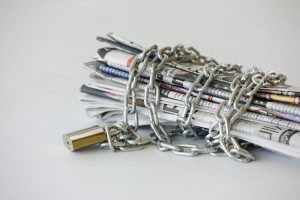US Plunges in Press Freedom Ranking
Freedom of the press is an essential attribute of any real democracy. At least it is certainly supposed to be. But according to a just-released report by the international press rights group, Reporters Without Borders (RWB), the US is lagging far behind the rest of the free world when it comes to honoring this democratic mainstay. This comes from RWB’s 2014 World Press Freedom Index, the most recent edition of its annual survey of how much freedom journalists and news organizations enjoy around the world.
Out of the 180 countries RWB ranked in this year’s index — based on input from a global collection of journalists, news organizations, researchers and other freedom of expression groups — the US came in at 46. This was a 13-place drop from last year and represents one of the steepest tumbles in the rankings. It also places us surprisingly lower in press freedoms than the likes of Romania (45), Botswana (41), El Salvador (38), Slovenia (34), Ghana (27), Slovakia (20), Poland (19) and a long list of countries without the democratic lifeblood that supposedly sets this country apart on the international stage.
So what is the reason for this relatively dismal performance? According to RWB, it has to do with the government’s crackdown on national security whistleblowers — like Edward Snowden and Bradley Manning — as well as the journalists who dare to disclose their revelations:
9/11 spawned a major conflict between the imperatives of national security and the principles of the Constitution’s First Amendment. . . . [T]he heritage of the 1776 Constitution was shaken to its foundations during George W. Bush’s two terms as president by the way journalists were harassed and even imprisoned for refusing to reveal their sources or surrender their files to federal judicial officials. There has been little improvement in practice under Barack Obama. Rather than pursuing journalists, the emphasis has been on going after their sources, but often using the journalist to identify them.
For RWB, the bottom line reason for America’s fall from press freedom grace is its unshakable view that when it comes to national security these days, “the whistleblower is the enemy.” And so is the journalist who tries to give the whistleblower a voice. Hence the recent DOJ seizure of Associated Press phone records and the other attacks the US has launched against reporters working with whistleblowers in the national intelligence community (which the RWB report highlighted).
There certainly is room for debate on the proper balance between national security and maintaining our fundamental Constitutional rights. But perhaps this report will serve as a wakeup call that — with so many other (and arguably lesser) democracies doing more to support their press freedoms — perhaps the US is not doing as much as it can to find the right balance. And for those eternal skeptics on where the US is heading, there is a silver lining in the RWB’s otherwise dreary indictment on the state of our democratic affairs. We are still ranked well above Mr. Snowden’s chosen (kind of) domicile, Russia, which bottomed out at 148 in the RWB ranking.
 By
By